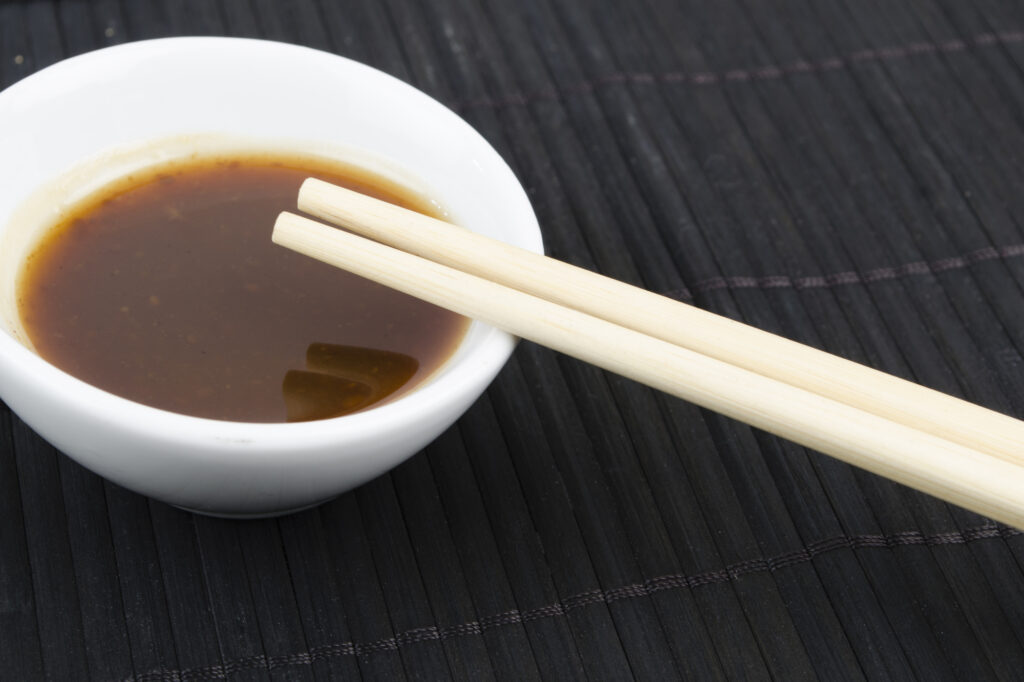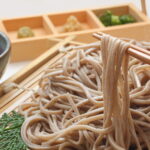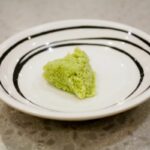We tend to think of BBQ sauce as something unique to the United States—specifically, its Southern regions. From honey-sweet to tangy vinegar, fiery hot to smoky yet savory, BBQ sauces come in all types of flavors and styles, to complement nearly any cut of meat.
What even the most ardent BBQ lover might not realize is that BBQ sauces exist in other countries of the world, including Japan. In fact, Japanese BBQ sauce is gaining major popularity—even among hardcore meat enthusiasts in the U.S.
If you haven’t tried Japanese BBQ sauce, you’re missing out. This flavorful, versatile condiment is an excellent addition to a wide variety of dishes, from scrambled eggs to stir-fry, dumplings to marinades and so much more. What makes this sauce so special? The unique combination of ingredients set this sauce apart from its closest relative, Western BBQ sauce.
Here’s what you need to know about this incredible condiment and why it’s a must-try, especially if you’re an ardent BBQ lover.

Japanese BBQ sauce vs. Western BBQ sauce
Most people are familiar with Western BBQ sauce. Typical Western BBQ is used as a marinade or condiment for meat cooked in the barbecue cooking style. Its main ingredients are vinegar, mustard and tomato, and brown sugar is often used as a sweetener.
Western BBQ sauce usually has a tangy flavor, but the exact taste varies from region to region, and you can find varieties that have more of a sweet, sour, smoky or spicy taste. Here are a few popular examples:
- Texas-style BBQ sauce is typically hotter, flavored with smoked chili peppers.
- Tennessee-style BBQ sauce is a more “sweet and sour” BBQ sauce compared to others.
- South Carolina-style BBQ sauce uses vinegar to thin the sauce and add a bite.
- North Carolina-style BBQ sauce is often built on a tangy mustard base.
- Kansas-style BBQ sauce uses molasses as a sweetener, which makes it thicker.
Compared to these varieties, Japanese BBQ sauce is quite different from its Western counterparts—but it’s just as versatile. It has a more complex taste than other sauces you’d get out of the bottle, and the ingredient profile is a bit different. From pizza to eggs, it elevates any dish you add it to.
Why is the Japanese take on BBQ sauce gaining popularity around the world? The sauce not only elevates the flavor profiles of any dish, it also keeps your food moist and juicy. It’s well-balanced, providing the perfect umami flavor without being too sweet.
The ingredients behind great Japanese BBQ sauce
Japanese BBQ sauce—like the well-known Bachan’s brand—relies on a short ingredient list for its impressive flavor. All ingredients in Bachan’s are non-GMO and mostly organic. Even the process has been carefully considered, and Japanese BBQ sauce is cold filled, with no preservatives or additives to worry about. The full list of ingredients includes:
- Soy sauce (water, soybeans, wheat, salt)
- Cane sugar
- Mirin (water, rice, koji seed, sea salt)
- Tomato paste
- Ginger
- Green onion
- Rice vinegar
- Garlic
- Sea salt
- Toasted sesame oil
This unique blend of ingredients delivers an umami flavor base, with cane sugar and mirin adding a complex sweetness. The notes of green onion, ginger and garlic provide an incredible aroma and savory flavors. Not surprisingly, these are also staple flavors in other common Japanese dishes, which serves to imbue some of the culture in a sauce that’s widely applicable across numerous dishes and foreign cuisines.
Japanese BBQ sauce and dietary restrictions
One of the reasons BBQ sauce is so popular in America is because there are very few ingredients and often, those ingredients are safe for all diets: gluten-free, soy-free, dairy-free, shellfish-free, etc. Unfortunately, this is another area where Japanese BBQ sauce departs from the norm.
Based on the ingredients in a classic Japanese BBQ sauce, it’s not compliant with a variety of dietary restrictions. Specifically, the soy sauce component puts it out of reach for those with gluten- and soy-free diets. That said, it’s still broadly applicable for those with allergies to nuts, shellfish or dairy.
Keep in mind that there are many different recipes and different takes on how to make Japanese BBQ. Always read labels or ask wait staff in restaurants about potential allergens if you’re not sure about the contents of a specific sauce or recipe.
Dishes to try Japanese BBQ sauce on
The unique umami flavors of Japanese BBQ sauce make it a versatile sauce that tastes good on almost any food. From stir-fry to salmon, and even your morning eggs, Japanese BBQ sauce complements a wide range of dishes. It’s even great on pizza—substitute the sauce for your usual BBQ sauce on a BBQ chicken pizza for a flavor experience like no other.
One of the best ways to use Japanese BBQ sauce is with vegetables. The sauce gives any vegetable—especially broccoli—a wonderful flavor. It’s an easy way to get kids—and vegetable-averse adults—to eat their greens!
Not sure what to cook with Japanese BBQ sauce? There’s no shortage of great recipes to try, including:
- Beef chow fun
- Yuzu tomato soup with grilled cheese
- Crispy roasted potatoes
- Caramelized pork and eggs
- Tangy yuzu, kale and apple salad
- Classic teriyaki beef
- Classic Seattle teriyaki beef
- Hot and spicy beef tacos
- Yuzu summer grilled corn
- And so much more!
Keep in mind that unlike American BBQ sauces—which are meant to be slathered across a meaty dish—Japanese BBQ is more of a condiment. You can certainly coat a roast with it; however, you might find that it’s even more enjoyable on a burger or as a dipping sauce for a medium-rare steak. With these flavors, less is more!
Japanese BBQ sauce vs. Korean BBQ sauce
BBQ sauce enthusiasts are likely familiar with Korean BBQ sauce, which is another popular world variety. However, it’s important to realize that while both are from Asiatic regions, Japanese BBQ sauce and Korean BBQ sauce are distinct and different.
While Japanese BBQ sauce focuses more on an umami flavor combination, Korean BBQ sauce tends to be sweeter—more like a teriyaki sauce. It’s also often flavored for heat with peppers and spices that drive up the intensity. By contrast, Japanese BBQ is almost always a mellow flavor and very rarely infused with anything that might spark a fire in your belly.
To make matters more confusing, there’s also a Japanese take on Korean BBQ called yakiniku. Typically, this refers to the entire practice of preparing and grilling various marinated meats; however, it can also refer to the marinade (tare) as well. Yakiniku sauces tend to be a balance of sweet, spicy, and tart flavors. It’s yet another cuisine option to try while you’re in Japan—or South Korea, for that matter!
Popular Japanese BBQ sauce brands
While there are endless BBQ producers and varieties in the United States, the selection of authentic Japanese sauces is much, much smaller. In fact, there are only a handful of brand-name options to choose from—especially for international BBQ enthusiasts.
- Bachan’s is the most well-known and universally highest-rated among authentic Japanese BBQ sauces. It’s a small batch brand that’s made using natural ingredients, and follows traditional preparation methods to ensure the best comingling of those ingredients. It’s widely used and respected by chefs and food enthusiasts worldwide.
- Jojoen Yakiniku BBQ sauce blurs the lines between traditional Japanese BBQ sauce and Korean BBQ sauce, for a perfect blend that many people swear by. There’s a little sweetness, a little spice, and a flavorful blend of umami flavors that make this a complete sauce for virtually any meat entrée. It’s produced by a world-famous Japanese restaurant.
- Gyu-kaku BBQ sauce is a more commercialized option that’s produced in Japan and exported all across the world. This is another BBQ sauce that’s produced by a restaurant—one that has locations all over the world. It features all of the signature flavors you’d expect from a Japanese BBQ sauce, and goes great with any meat.
Keep in mind that these are only the top BBQ sauces produced in Japan. BBQ sauce hobbyists and enthusiasts from around the world have put their own spin on Japanese flavors, producing variations that blend cultures, flavors and ingredients.
Give Japanese BBQ sauce a try
In the mood for some incredible umami flavor? Japanese BBQ sauce is a condiment everyone should try, even if you aren’t the biggest fan of traditional Japanese food. It’s perfect balance of flavors delivers a perfect umami kiss to literally any type of food you’re cooking or eating. Grab a bottle of Japanese BBQ sauce, add a dash to your favorite foods and enjoy!
If you’re traveling to Japan or moving to a city like Tokyo, Osaka or Kyoto, keep your eye out for Japanese BBQ restaurants or steakhouses, which often feature different BBQ sauce options on the menu. Many smaller establishments will even have their own house sauce to try. It’s a great way to satisfy your craving for BBQ, with a unique twist of Japanese flavoring!
- How Much Money Can You Make Teaching English in Japan? - December 12, 2022
- The Best Places to Teach English in Japan - December 9, 2022
- The Best Credentials for Teaching English in Japan - December 8, 2022







